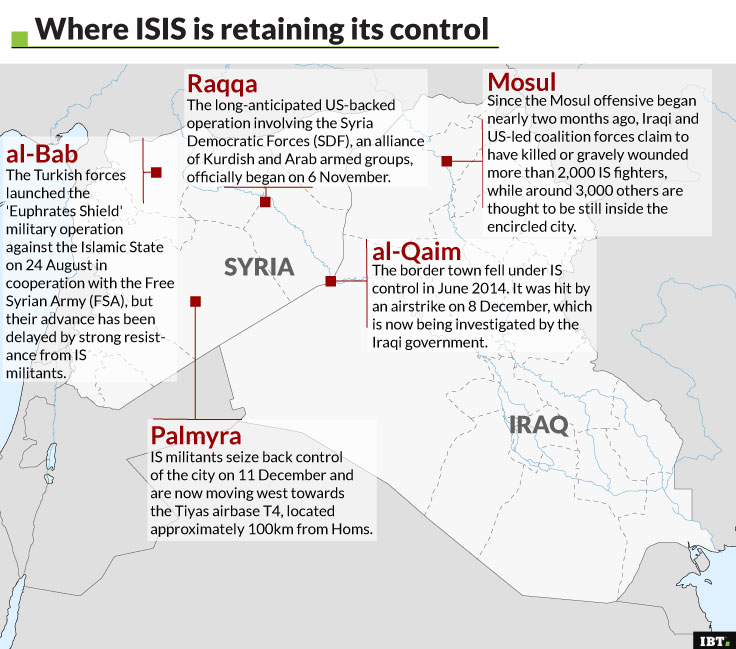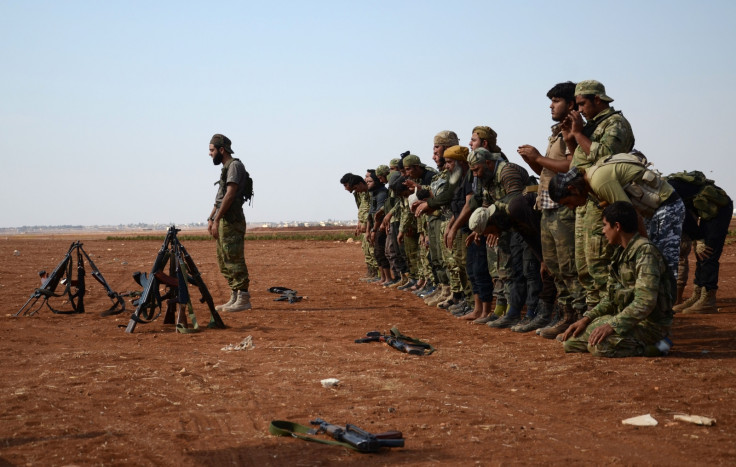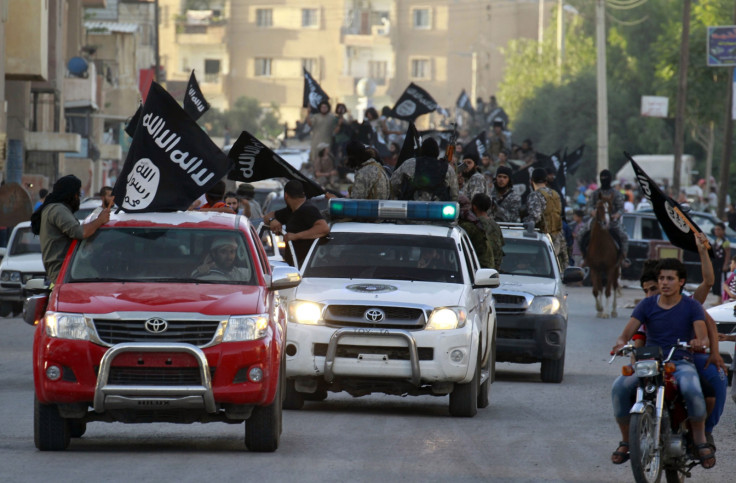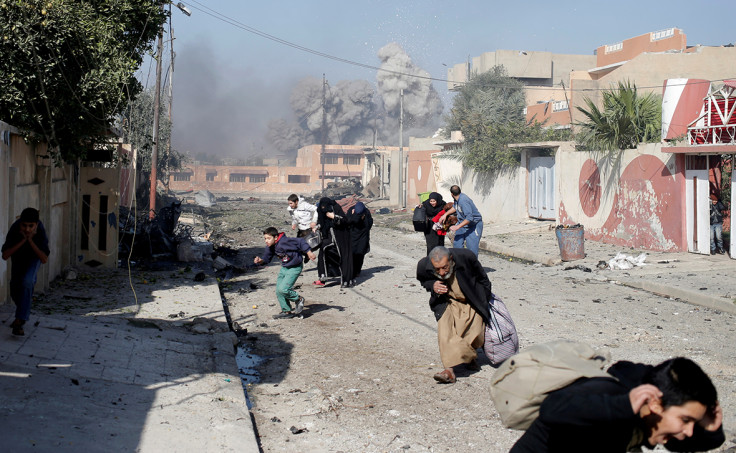Palmyra and four other hot spots where Islamic State is still a potent force in Syria and Iraq
Recapture of Palmyra is reminder of threat the militant group still poses despite suffering setbacks.
The Islamic State's (Isis) recapturing of the ancient city of Palmyra marks the most significant victory for the militants in recent months. Over the course of 2016, IS (also known as Daesh) has suffered a string of defeats in Syria, Iraq, and Libya, losing control of several towns and cities it had captured in the past two years.
The conquest of Palmyra, despite heavy bombing from the Russian forces, is a reminder of the threat the militant group continues to present despite numerous attacks and setbacks.
Isis still holds control over large parts of northern Syria, including Raqqa, the Syrian de-facto capital, and is holding on to the city of Mosul, where the coalition forces, led by the Iraqi army, have failed to make significant gains ever since entering the eastern part of the city.
While the overall territory under IS control has shrunk, the group continues to carry out attacks. In a visit to Iraq on 10 December, US Defence Secretary Ash Carter promised to dispatch 200 US troops to Syria to train and advise local fighters against Isis, adding to the 300 already authorised for the Syrian effort, and some 5,000 in Iraq.
IBTimes UK takes a closer look at five places at the forefront of the war against the Islamic State in Iraq and Syria.


SYRIA
Palmyra
Syrian government forces aided by Russia retook the city – known for its 2,000-year-old ruins – from IS in March 2016, in a big show of force against global terrorism. But as the regime's focus moved to taking eastern Aleppo from the control of the rebels, defence around Palmyra weakened and IS militants seized the opportunity, beginning the advance towards the city on 8 December.
Russian forces launched 64 strikes against Islamist fighters and at first the bombing seemed to be successful in provoking a retreating but, as reinforcements from northern Syria came to aid IS fighters, they regrouped and attacked from multiple sides, eventually managing to seize back control of the city.
According to the the UK-based Syrian Observatory for Human Rights, the battle left the militants with a renewed arsenal including 30 Russian tanks, large quantities of surface-to-surface Grad missiles, ammunition and tanks shells.
IS militants are now reportedly moving west towards the Tiyas airbase T4, located approximately 100km from Homs and 60km from Palmyra, which is used by Russian forces. The Isis media channel also claimed that nearby oil and gas fields were also captured.
According to Mohammed Hassan al-Homsi, who runs the Palmyra News Network, the Islamist group is steering away from northern Syria, where Turkey and the anti-IS international coalition have focused their fight, eyeing new territory. Palmyra's desert terrain linked to Iraq and its surrounding oil and gas fields makes it a strategically-valuable position for IS, al-Homsi said, as reported by the Associated Press.

Al-Bab
The largest amount of territory under Isis control remains in northern Syria, from Al-Bab to Deir ez-Zor, passing through Raqqa. The Turkish air force have engaged in heavy fighting in the IS-held area of Al-Bab in northern Syria, close to the border with Turkey.
The Turkish forces launched the 'Euphrates Shield' military operation against the Islamic State on 24 August in cooperation with the Free Syrian Army (FSA). Their advance into IS-held territory in northern Syria has been delayed by nearly 1000 booby traps and explosive devices, although Turkish media also reported that ground forces have hit more than 100 IS-related targets in the al-Bab, Tadif and Zarzur areas on 11 and 12 December, killing four Isis members in the process.
But IS is not the only target for Turkey in northern Syria, as Ankara is busy hitting the Syrian Kurdish Democratic Union Party forces, which it lists as a terrorist group affiliated to the Kurdish Workers' Party (PKK).
As Kurdish forces themselves are busy fighting the Islamic State, the resulting tensions threaten to compromise the result of the Euphrates Shield operations against the Islamist militants, as noted in a report from the Washington-based Institute for the Study of War (ISW).

Raqqa
The battle to free Raqqa from IS control is instead fought by a US-led coalition. Reuters reported that Syrian ruler Bashar al-Assad has actually written off the city for now, leaving Western forces to focus on the Syrian capital of the so-called Islamic caliphate.
"The regime forgot about Raqqa a long time ago and made it the responsibility of the Americans. Let those alarmed by Daesh go and remove it," an official close to Assad told Reuters.
The long-anticipated US-backed operation involving the Syria Democratic Forces (SDF), an alliance of Kurdish and Arab armed groups, officially began on 6 November. The ground forces are advancing into IS-held territory from the Kurdish territory in the north. A statement from the US-led coalition released on 12 December claimed the SDF has already liberated "dozens of villages and more than 1800 sq km (700 sq m) of IS-held terrain".
According to the statement, the US-led coalition has also provided support through more than 300 strikes and delivering more than 850 munitions in support of the ground forces.
The UK-based Syrian Observatory for Human Rights has frequently reported of civilians death in Raqqa following heavy bombardment from US-led coalition warplanes. In its latest bulletin, it reported at least 21 people died in an airstrike, including five children and four women, with the death toll expected to rise. Activists from the Raqqa is Being Slaughtered Silently group however reported that Russian airstrikes have hit the city as recently as 12 December, also killing 20 civilians.
Considering the two-year rule of the Islamic State, the actual state of affairs in Raqqa may be difficult to determine, but it is clear that the militants will fight with all their might to defend their last stronghold in Syria, particularly since Isis' other stronghold in Iraq, Mosul, has been under attack from Iraqi forces since 17 October.

IRAQ
Mosul
Since the Mosul offensive began nearly two months ago, Iraqi and US-led coalition forces claim to have killed or gravely wounded more than 2,000 IS fighters.
Speaking at a news conference with Secretary Carter at Qayyara air base, another area that used to be under IS control but was liberated in August 2016, US chief commander in Iraq Stephen Townsend said that around 3,000 Isis militants are thought to be still inside the city, which has been surrounded.
Renad Mansour, Middle East and Northern Africa fellow at Chatham House, told IBTimes UK that the reason why the government forces have not penetrated further into Mosul, ever since entering its eastern neighbourhood, is to minimise civilian casualties.
"The coalition does not want to just bomb Mosul, especially if there are still civilians inside. It shows the Islamic State tactic of hiding among the civilian population because they know this will complicate the battle," Mansour said, "It's not a victory for the Islamic State that it is taking long, eventually they will be defeated."
al-Qaim
Crucial to the crossing of IS militants between Iraq and Syria is the border town of al-Qaim, which was captured in June 2014.
On 8 December, the city was bombed in an airstrike that killed around 60 civilians, including 12 women and 19 children. The US-coalition denied involvement in the bombing, and the Islamic State news agency Amaq blamed the Iraqi airforce, but the Iraqi army also denied the accusation. Reuters reported the Iraqi government is investigating the matter.
These kinds of attacks on the civilian population deter the trust in the Iraqi government so that, even if the IS were to be driven out of those areas, the people living there would still not trust the central government authority.
"As long as the Sunnis in this areas don' t feel like Baghdad represents them, they would still find the Islamic State better than the other option" said Mansour. "I think they will now be looking for an alternative to the Islamic State because it has failed to provide governance."
According to him, the Islamic State is hoping that the political elite in Iraq would be unable to come to any form of political solution, which will open space for them to come back, "in a few years if not earlier."
Even in places like Fallujah, which was liberated from the Islamic State in June, the militants retain pockets of territory in the outskirts of the city, which they continue to attack with suicide car bombings. The most recent one, on 11 December, targeted a checkpoint, killing at least eight people. Last month, Isis launched three separate suicide attacks in and near Fallujah, killing more than a dozen people.
© Copyright IBTimes 2025. All rights reserved.






















